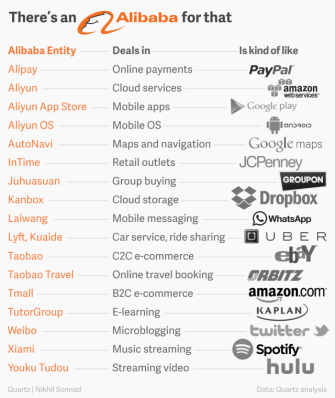The article is based on Alibaba SWOT analysis, which can be found in the Library, in CayenneApps SWOT application.
With a population of 1.3 billion, and annual GDP growth rates of 9-10% for the past 30 years, China has quickly become the world second largest economy just after the United States, and is increasingly playing an important and influential role in the global economy. This positive change can be also seen in the rapid growth of the Chinese middle class.
This favorable economic situation and the enrichment of the large segment of Chinese society created a great opportunities to benefit from the growth and to build a large marketing empire. These opportunities were effectively seized by Alibaba, a holding company which now dominates the domestic Chinese e-commerce market.
Let’s take a closer look at the strengths, weaknesses, opportunities and threats of this Chinese giant.
Scale of the dominance
Founded by former English teacher Jack Ma, Alibaba accounts for about 80 percent of all online retail sales in China. Internet usage in the Middle Kingdom is continually expanding, and as the largest e-commerce company in the country Alibaba boasts 279 million annual active buyers who place 14.5 billion orders a year.
This dominance was achieved through Taobao (C2C), China’s version of eBay, and Tmall (B2C), another popular shopping destination where major international brands like Nike and Samsung have online stores.The company also operates Alibaba.com, which connects small businesses around the world with Chinese suppliers, and it has developed a fast-growing cashless payment system, Alipay, which is a Chinese version of PayPal.

The major strength of Alibaba is that it now offers a wide ecosystem for all participants – consumers, merchants, third-party service providers and others. It provides services such as: financial products, highly scalable platforms for cloud computing and data management, and a logistics information platform which provides real-time access to information for both buyers and sellers.
This vast ecosystem is also supported by a wide selection of products, from televisions, home appliances and food to cars. This could be developed because Alibaba’s sites are general in nature: anyone can sell anything.
This flexibility, combined with a favorable environment for e-commerce in China where offline competition is relatively weak are the reasons why the Taobao Marketplace is one of the world’s top 10 most visited websites according to Alexa Ranking, and is now worth more than Facebook, Amazon or eBay.
Fast track to high valuation
Jack Ma, a former English teacher, founded Alibaba in 1999. From 1999 to 2000, the Alibaba Group raised a total of US$25 million from SoftBank, Goldman Sachs and some other institutions. Then, during the beginning of the Chinese domestic e-commerce boom in the mid 2000s, Alibaba received a $1billion investment from Yahoo in exchange for 40% of the company.
 Years of successful decisions and impressive growth prepared the company for going public in the U.S. Jonathan Lu, a former CEO of Alibaba, successfully went through the process of initial public offering on the NYSE, which was the largest IPO in history. Alibaba became one of the most valuable tech companies in the world after raising $25 billion from its U.S. IPO.
Years of successful decisions and impressive growth prepared the company for going public in the U.S. Jonathan Lu, a former CEO of Alibaba, successfully went through the process of initial public offering on the NYSE, which was the largest IPO in history. Alibaba became one of the most valuable tech companies in the world after raising $25 billion from its U.S. IPO.
The high valuation and resources of the company have opened many possibilities and created many new opportunities which are described in the words of co-founder and executive chairman Jack Ma:
We want to be bigger than Walmart (…) We hope in 15 years, they’ll say this is a company like Microsoft, like IBM, like Walmart changed, shaped the world.
Plans for the future
China is moving from an export driven economy to a more Western one that is geared to its local consumers. This creates many opportunities for Alibaba and chance to further development of relationships between Chinese merchants and consumers with foreign buyers and sellers.
At the same time, studies of China’s inequality report show that the gap between urban and rural household incomes in China is large and has increased over time. Alibaba seems to perfectly understand the environment in which it operates, and already planned cooperation with China Telecom to take advantage of this urban/rural income disparity. Alibaba plans to sell inexpensive smartphones aimed at boosting mobile commerce in smaller cities and rural areas with its applications pre-installed.
This is an excellent example of Alibaba making use of resources and scale of operations. In the future, the partnerships and collaboration with companies from different sectors seems to be a natural and promising way to further expansion, by using Alibaba’s big data analyses to prepare ads to prospective car buyers, offer loans and provide after-sale services.
Political Issues
The understanding of the environment in which Alibaba operates also can be applied to the political issues, because China is a long way from being a completely free market. The Communist Party runs most major businesses, either through direct control or by fiat. But the government has had relatively hands-off policy in the e-commerce space, and Alibaba is an excellent example of innovative entrepreneurship that can count on the government’s kind support. However political favor in China can vanish overnight because of Communist Party’s dominant role — this can result in a decision to curb the economic and social power of tech monopolies, or other unfavorable decisions. These political risks may become Alibaba’s biggest financial threat.
The Chinese government already accused e-commerce giant Alibaba of failing to crack down on the sale of counterfeit goods, bribery and other illegal activities on its sites in a rare public dispute. This can be a double warning sign for Alibaba, that it has its weaknesses such as “credibility risk” and possible threats, such as operations in only one country.

Possible expansion abroad
One possible scenario for further expansion is growth beyond China borders. Here the company will face at least two obstacles: Alibaba is an unknown worldwide brand and has strong competition.
An Ipsos poll conducted for Thomson Reuters shows that 88% of Americans had not heard of Alibaba. A week after the company went public, the number had fallen, but remains at a high 76%. However Americans recognize giants such as: Amazon, eBay and Walmart very well, which are considered to be the main competitors of the Chinese company.
A huge advantage of the company might be its aggressive and smart marketing that Alibaba already knows how to successfully make use of, e.g. exploiting the fastest growing channels (mobile) and utilizing the latest trends in mass-marketing such as flash sales promotions (eg. 11/11 known now as Singles Day: the holiday which was invented by Alibaba in 2009 as a play on a two-decades-old celebration of China’s bachelors).
Summary
Alibaba could be the vanguard of a new era in Western economy. The aggressive strategy that we received during our SWOT analysis for Alibaba might mean that the flood of dominance by Asian companies has just begun, and will certainly change the market that we currently know.
If the company can deal successfully with internal problems such as excessively quick growth and address the problems associated its large scale of operations such as difficulties with management and implementation changes, we might soon be some of their customers abroad.
The SWOT analysis for the Alibaba Group can be find in our Examples Library. You can also check out our other SWOTs including analyses for: Tesla Motors, Uber, Airbnb, Walmart and McDonald’s.
[…] Alibaba, one of the biggest e-commerce players in the world, has built its dominant position on the market on the backs of Taobao, which is a Chinese equivalent of eBay, the costs of which are significantly lower than Amazon’s due to the fact they have no warehouses or logistics infrastructure. As a result, the profit margin of Alibaba in 2014 fluctuated around 40%, while the profit margin of Amazon is still close to 0% and the American company is recording more and more losses. […]
Now in alexa Taobao is no.12 as facebook is no.3. Taobao is still no where to Facebook.